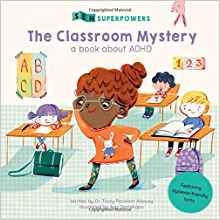ADHD
ADHD Superpower
Meet Izzy: Fearless detective with a memory superpower.
Posted November 24, 2019
ADHD is a common learning difficulty that can cause problems with certain abilities, such as:
Inhibition
Inhibition is the ability to control inappropriate behavior, thoughts and speech. Children with ADHD usually have poor inhibition and can be impulsive, doing or thinking about the wrong things at the wrong time. For example, they may get up and walk around during a test.
Attention
Children with ADHD have difficulties when they have to focus their attention on activities that they find long and boring. They may therefore have trouble monitoring their actions, losing sight of what they need to accomplish.
Keeping still
ADHD is associated with hyperactivity, restlessness and fidgeting. When students with ADHD get an urge to get up and walk around, or let their thoughts wander, they struggle to suppress the urge.
Try to consider the suitability of tasks that you give to a child with ADHD. They might find the above things tricky, but despite not being able to focus their attention for a long time, they are able to direct their attention on a single task and become so absorbed with it that they don’t notice anything or anyone around them. Like Izzy, children with ADHD can be good at problem solving, thinking outside the box, and can be very intuitive.

In my Children’s book, The Classroom Mystery, Izzy saw connections others missed and she was good at thinking outside the box.
Here is an excerpt:
But Izzy wasn’t giving up yet. She focused on the problem and thought carefully about everything she had heard that day.
Then she remembered something else…
TIPS FOR BOOSTING ABILITIES
Here are some handy tips for boosting your memory skills.
Time bursts
To boost concentration, short bursts of effort, such as 5 to 10 minutes, are better than a prolonged length of time. It can also help to take a short break between each 5 to 10-minute period.
Use a visual timer
To help keep track of time and manage your own schedule, use a visual timer that you can see easily.
Repeat for revision
If you’re revising for an exam, try doing it intermittently, rather than at a set time each week.
Where was I?
If you’re trying to remember information, try and think of where you were when you learned the information. What time of day was it? What were you wearing?
Connect your actions
Try doing a physical action when you’re learning to connect the action with the information. Then, when you need to recall the information, perform the action in order to trigger your memory.


